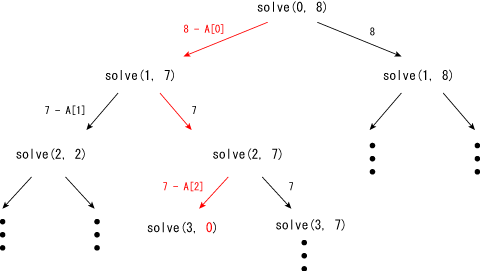Exhaustive Search
Write a program which reads a sequence A of n elements and an integer M, and outputs "yes" if you can make M by adding elements in A, otherwise "no". You can use an element only once.
You are given the sequence A and q questions where each question contains Mi.
Input
In the first line n is given. In the second line, n integers are given. In the third line q is given. Then, in the fourth line, q integers (Mi) are given.
Output
For each question Mi, print yes or no.
Constraints
- n ≤ 20
- q ≤ 200
- 1 ≤ elements in A ≤ 2000
- 1 ≤ Mi ≤ 2000
Sample Input 1
5 1 5 7 10 21 8 2 4 17 8 22 21 100 35
Sample Output 1
no no yes yes yes yes no no
Notes
You can solve this problem by a Burte Force approach. Suppose solve(p, t) is a function which checkes whether you can make t by selecting elements after p-th element (inclusive). Then you can recursively call the following functions:
solve(0, M)
solve(1, M-{sum created from elements before 1st element})
solve(2, M-{sum created from elements before 2nd element})
...
The recursive function has two choices: you selected p-th element and not. So, you can check solve(p+1, t-A[p]) and solve(p+1, t) in solve(p, t) to check the all combinations.
For example, the following figure shows that 8 can be made by A[0] + A[2].
